
Dr. Kenneth Rosenthal
Dr. Jonathan C. O’Quinn
Dr. Michael J. Price

Dr. Kenneth Rosenthal
Dr. Jonathan C. O’Quinn
Dr. Michael J. Price
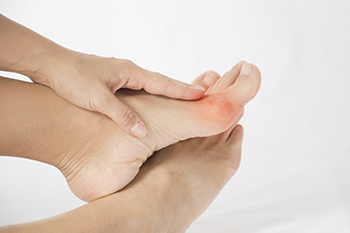
Bunions are essentially defined as bumps that can form on the side of the big toe or pinky toe that are bony in texture. Many patients with bunions are often interested in learning more about why they have developed this condition and what contributed to it. The answer may surprise many patients. Interestingly, heredity and genetics is one of the major contributing factors in bunions. Specifically, the shape of your foot that you inherit from your parents is a major factor that can determine your susceptibility to bunions. Unfortunately, individuals do not have control over their genetic disposition to bunions. It is estimated that more than 80 percent of individuals living with bunions have a history in their family tree of bunions. Although this may lead one to believe that they can do nothing to prevent the development of bunions, this is not technically true. There are a number of steps that an individual can take to mitigate their risk of developing bunions, such as wearing footwear that fits properly. Contact a podiatrist today for more information.
If you are suffering from bunions, contact one of our podiatrists of Eastern Carolina Foot & Ankle Specialists. Our doctors can provide the care you need to keep you pain-free and on your feet.
What Is a Bunion?
A bunion is formed of swollen tissue or an enlargement of boney growth, usually located at the base joint of the toe that connects to the foot. The swelling occurs due to the bones in the big toe shifting inward, which impacts the other toes of the foot. This causes the area around the base of the big toe to become inflamed and painful.
Why Do Bunions Form?
Genetics – Susceptibility to bunions are often hereditary
Stress on the feet – Poorly fitted and uncomfortable footwear that places stress on feet, such as heels, can worsen existing bunions
How Are Bunions Diagnosed?
Doctors often perform two tests – blood tests and x-rays – when trying to diagnose bunions, especially in the early stages of development. Blood tests help determine if the foot pain is being caused by something else, such as arthritis, while x-rays provide a clear picture of your bone structure to your doctor.
How Are Bunions Treated?
If you have any questions, please feel free to contact our office located in Greenville, NC . We offer the newest diagnostic and treatment technologies for all your foot care needs.
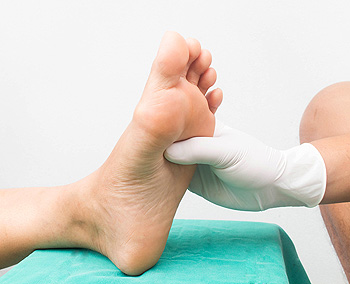
Many people with diabetes begin to develop problems in their lower legs and feet. Many develop corns, calluses, blisters, and skin ulcers. The main cause of ulcers is an increased level of blood sugar in the body, which can damage nerves (specifically those in the extremities). The result is a condition known as diabetic neuropathy, which is experienced by about 70 percent of diabetics, studies show. The numbing sensation to the feet invites all sorts of problems, including cracked heels, sores that go undetected, and increased exposure to bacterial and fungal infections. It is suggested that diabetics examine their feet daily for cracks, wounds, and sores. Wear shoes that fit properly, and avoid socks that are too tight. Avoid walking barefoot, indoors and out. Keep the feet clean and thoroughly dried each day. Quitting smoking and doing low-impact exercise are recommended by experts. Most importantly, if you have foot problems related to diabetes, please contact a podiatrist for regular visits to stay on top of any complications that may develop.
Diabetic foot care is important in preventing foot ailments such as ulcers. If you are suffering from diabetes or have any other concerns about your feet, contact one of our podiatrists from Eastern Carolina Foot & Ankle Specialists. Our doctors can provide the care you need to keep you pain-free and on your feet.
Diabetic Foot Care
Diabetes affects millions of people every year. The condition can damage blood vessels in many parts of the body, especially the feet. Because of this, taking care of your feet is essential if you have diabetes, and having a podiatrist help monitor your foot health is highly recommended.
The Importance of Caring for Your Feet
Patients with diabetes should have their doctor monitor their blood levels, as blood sugar levels play such a huge role in diabetic care. Monitoring these levels on a regular basis is highly advised.
It is always best to inform your healthcare professional of any concerns you may have regarding your feet, especially for diabetic patients. Early treatment and routine foot examinations are keys to maintaining proper health, especially because severe complications can arise if proper treatment is not applied.
If you have any questions please feel free to contact our office located in Greenville, NC . We offer the newest diagnostic and treatment technologies for all your foot and ankle needs.
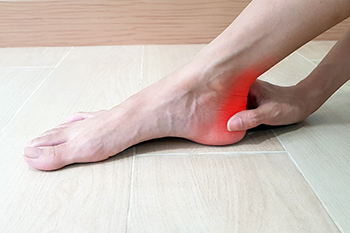
Achilles tendonitis is a condition that affects the large tendon that connects the calf muscles to the heel. When the Achilles tendon becomes inflamed, most commonly from overuse, it causes pain in the back of the foot and the heel. Most at risk for this type of injury are active adults between 30 and 50 years old. The pain often worsens after exercising and can be accompanied by stiffness, swelling, and tenderness to the touch. Because Achilles tendonitis is an overuse injury, it is a good idea to avoid sudden increases in the amount or frequency of exercise. Jumping repeatedly during exercise and running on hard surfaces also can add to the damage. Most importantly, choose supportive footwear that provides ample cushioning and arch support. If you believe you may have an Achilles tendon injury, please consult a podiatrist who can perform diagnostic tests to determine the severity of the condition and offer appropriate treatment options.
Achilles tendon injuries need immediate attention to avoid future complications. If you have any concerns, contact one of our podiatrists of Eastern Carolina Foot & Ankle Specialists. Our doctors can provide the care you need to keep you pain-free and on your feet.
What Is the Achilles Tendon?
The Achilles tendon is a tendon that connects the lower leg muscles and calf to the heel of the foot. It is the strongest tendon in the human body and is essential for making movement possible. Because this tendon is such an integral part of the body, any injuries to it can create immense difficulties and should immediately be presented to a doctor.
What Are the Symptoms of an Achilles Tendon Injury?
There are various types of injuries that can affect the Achilles tendon. The two most common injuries are Achilles tendinitis and ruptures of the tendon.
Achilles Tendinitis Symptoms
Rupture Symptoms
Treatment and Prevention
Achilles tendon injuries are diagnosed by a thorough physical evaluation, which can include an MRI. Treatment involves rest, physical therapy, and in some cases, surgery. However, various preventative measures can be taken to avoid these injuries, such as:
If you have any questions please feel free to contact our office located in Greenville, NC . We offer the newest diagnostic tools and technology to treat your foot and ankle needs.
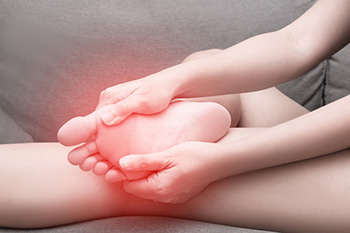
Having foot pain can wreak havoc in completing daily activities. Any type of foot pain is difficult to deal with, and many people often seek relief options. There are many reasons to have foot pain, including having endured an injury, changes to foot structure as a result of age, or from a recurring foot condition. Obesity may lead to having foot pain, which may come from the extra weight the feet must endure. A bunion or hammertoe may cause changes to the foot shape or structure, and is often uncomfortable. Research has shown that many foot conditions may possibly be prevented when specific stretches and exercises are frequently performed. This may be helpful in providing strength to the feet, which can be beneficial in maintaining balance. Foot pain can negatively impact the overall body, and it is strongly advised that you consult with a podiatrist if you are experiencing any type of foot pain. This type of doctor is recommended who can successfully determine the cause of the pain, and offer treatment methods that are right for you.
Foot Pain
Foot pain can be extremely painful and debilitating. If you have a foot pain, consult with one of our podiatrists from Eastern Carolina Foot & Ankle Specialists. Our doctors will assess your condition and provide you with quality foot and ankle treatment.
Causes
Foot pain is a very broad condition that could be caused by one or more ailments. The most common include:
Diagnosis
To figure out the cause of foot pain, podiatrists utilize several different methods. This can range from simple visual inspections and sensation tests to X-rays and MRI scans. Prior medical history, family medical history, and any recent physical traumatic events will all be taken into consideration for a proper diagnosis.
Treatment
Treatment depends upon the cause of the foot pain. Whether it is resting, staying off the foot, or having surgery; podiatrists have a number of treatment options available for foot pain.
If you have any questions, please feel free to contact our office located in Greenville, NC . We offer the newest diagnostic and treatment technologies for all your foot care needs.
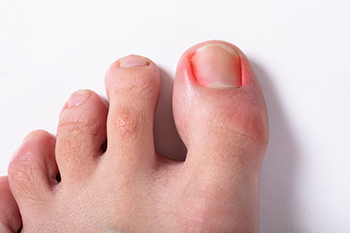
Sharp pain and redness in a toe where the nail meets the surrounding skin is usually caused by an ingrown toenail. In most cases, this condition is the result of improper trimming of the toenail which often affects the big toe. The sides of the nail can grow into the skin, and it can become red, sore, and painful. Wearing tight or rigid shoes and socks that restrict movement can worsen the pain. Additionally, the pain may increase if the nail becomes infected. If this occurs, it may ooze pus, and it is strongly suggested that you see a podiatrist at your earliest convenience. Depending on the severity of an ingrown toenail, it may be necessary to surgically remove part or all of the toenail. Medication to fight infection will likely be prescribed. Prevention of an ingrown toenail involves cutting the toenails straight across, keeping the feet clean and dry, and wearing shoes that fit properly. For more information on treatment options, please consult a podiatrist.
Ingrown toenails can become painful if they are not treated properly. For more information about ingrown toenails, contact one of our podiatrists of Eastern Carolina Foot & Ankle Specialists. Our doctors can provide the care you need to keep you pain-free and on your feet.
Ingrown Toenails
Ingrown toenails occur when a toenail grows sideways into the bed of the nail, causing pain, swelling, and possibly infection.
Causes
Prevention
Because ingrown toenails are not something found outside of shoe-wearing cultures, going barefoot as often as possible will decrease the likeliness of developing ingrown toenails. Wearing proper fitting shoes and using proper cutting techniques will also help decrease your risk of developing ingrown toenails.
Treatment
Ingrown toenails are a very treatable foot condition. In minor cases, soaking the affected area in salt or antibacterial soaps will not only help with the ingrown nail itself, but also help prevent any infections from occurring. In more severe cases, surgery is an option. In either case, speaking to your podiatrist about this condition will help you get a better understanding of specific treatment options that are right for you.
If you have any questions please feel free to contact our office located in Greenville, NC . We offer the newest diagnostic and treatment technologies for all your foot and ankle needs.